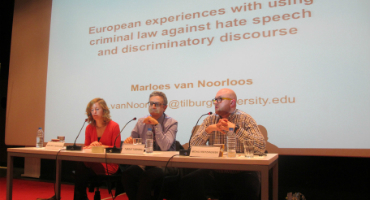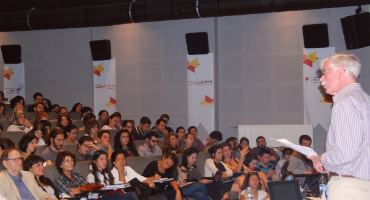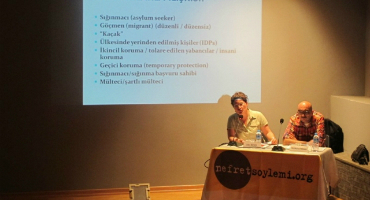Oslo University Professor Elisabeth Eide and Council of Europe’s László Földi speak at the “Discriminatory Discourse and Social Media” panel that was organized by the Hrant Dink Foundation, within the scope of its Media Watch on Hate Speech project, and with the cooperation of Istanbul Bilgi University on Oct. 26, 2013. The issues of how hate speech in traditional media and social media is produced, its effects and methods with which to combat it were debated.
Eide, who has worked on representations of freedom of speech and immigration, gender and climate change in the media, and Földi, a consultant and trainer on human rights and participatory democracy who directs the online campaign “No Hate Speech Movement,” spoke at the panel, which was moderated by Istanbul Bilgi University Assistant Professor Itir Erhart.
'We must take responsibility'
Eide, who discussed the work she has conducted on hate speech, pointed out that as social media has taken root, the public domain has been expanded. She touched upon the issues of censorship, freedom of speech and freedom of the press. If those in positions of responsibility do not take a stand against it, hate speech can become physical violence, she said. Eide discussed the role of hate speech and hate crimes in the 2011 massacre carried out by Anders Behring Breivik that killed 77 people and wounded 242 people. She focused on the concepts of “us” and “them” and said the media plays a large role in incidents of violence.
Eide explained how she has observed how Muslims are marginalised in the media and public domain in Europe. As the discourse against minorities, immigrants and Muslims in the media increased in recent years, views on whether there is a critical approach in the media and public sphere against these groups began to be debated. Eide also discussed her work in Afghanistan and Pakistan.
'Hate speech is everywhere'
After Eide’s speech, Földi made a presentation in which he expressed his views on fighting hate speech that still protects democracy and freedom of speech. Hate speech is everywhere, Földi said. Some online games that appear innocent enough may still contain hate and discriminatory discourse and can shape young people’s values and identities, underscoring the importance of the Internet in hate speech, Földi said.
Földi noted how extremism is on the rise in Europe again and said that if we don’t emphasise that what happened in the first and second World Wars was a result of hate speech, we will return to those days. Hate speech spreads more quickly via the Internet, but preventing this does not lie with governments, but with established Internet companies. Fighting hate speech requires education and knowledge and legal changes can support this, he said. Földi also provided information on the Council of Europe’s No Hate Speech Movement.





